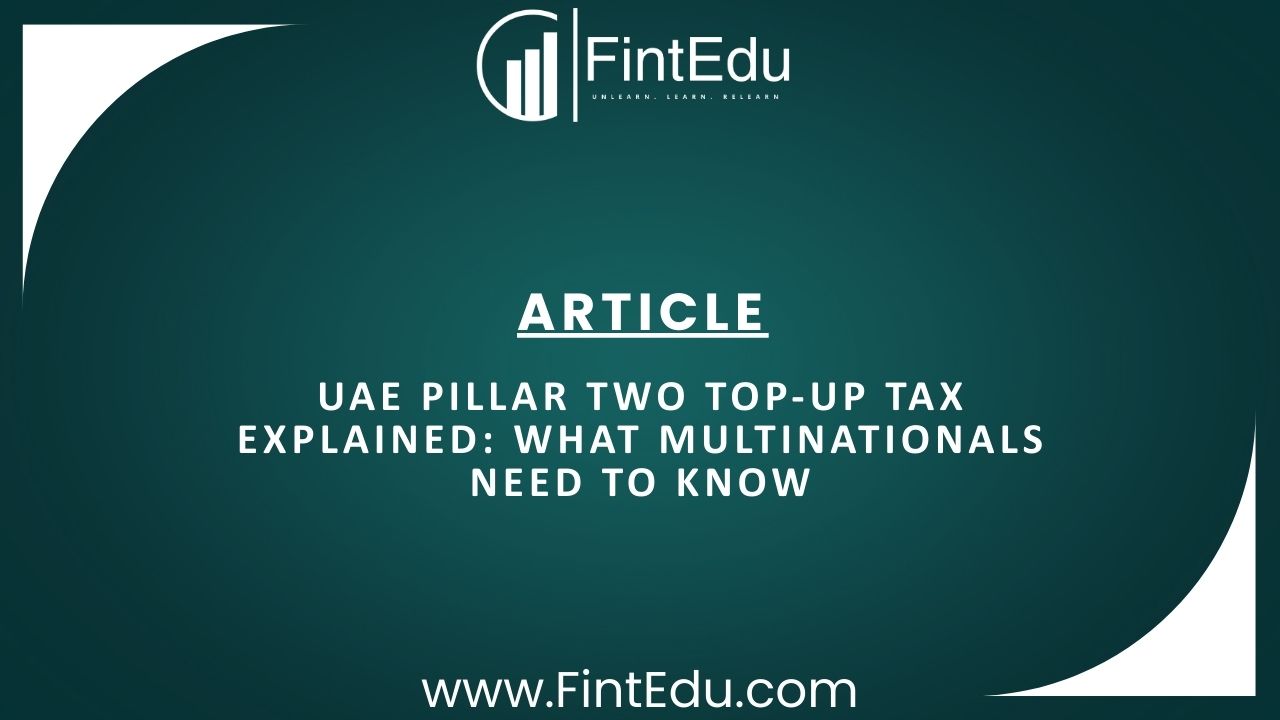LISTEN TO THIS ARTICLE
In UAE, Family Foundations have grown (in number) to become an integral part of the UAE's wealth management offering. A foundation, in principle, is a type of structure with a legal personality. A family foundation provides both non-residents and Emiratis, an attractive solution to manage their wealth, protect their assets, and make succession planning arrangements.
DIFC, the country’s premier financial hub alone has approximately 500 registered family foundations, and the number is growing very fast in light of the spurring interest shown by Ultra-High-Net-Worth Individuals (UHNIs) across the world.
This article seeks to outline the impact of UAE Corporate Tax law on the Family foundation structure with below outline –
- Whether family foundations are regarded as taxable person under UAE CT law?
- Whether SPV’s held by family foundation enjoy the same status as Family foundation?
- Family foundation revenue streams and their tax incidence
- Compliance requirements for the family foundation structure
1. Whether family foundations are regarded as taxable person under UAE CT law?
Family foundation assumes a separate legal personality and is therefore regarded as a taxable entity in its own right.
However, article 17 of the UAE CT Law provides an option to UAE family foundations to be treated fiscally transparent. Being fiscally transparent implies that the tax implication (if any) would shift to the beneficiary of the foundation. Accordingly, the family foundations have an option to choose from the routes below:
- Default route: Foundation is taxed on its own.
- Approval route: Foundation is treated as fiscally transparent, subject to approval from the authority upon the application.
Once the application is approved by the authority, the foundation would be treated as fiscally transparent for tax purposes from the beginning of the tax year in which the application is made.
Key conditions to be fulfilled for enjoying fiscal transparency
Broadly, a family foundation needs to satisfy below conditions to be treated as fiscally transparent:
- Established for the benefit of identified or identifiable natural persons, or for the benefit of a public benefit entity, or both.
- The principal activity is to receive, hold, invest, disburse, or otherwise manage assets or funds associated with savings or investment.
- Does not conduct any activity that would constitute Business as defined in the UAE CT law.
2. Whether SPV’s held by family foundation enjoy the same status as Family foundation?
Ministry of Finance, UAE issued Ministerial Decision No 261 of 2024 (MD 261) concerning taxation of Unincorporated Partnership, Foreign Partnership, and Family Foundations, which is applicable retrospectively from June 1, 2023 i.e. from the commencement of UAE CT law.
Notably, MD 261 has now extended the benefit of fiscally transparency to juridical persons i.e. companies, generally referred to as Special Purpose Vehicles (SPVs). SPVs are formed to own investments on behalf of foundations and provide.
In effect, the option of selecting between the two routes discussed above (i.e. Default route and Approval route) are extended to SPVs. Such SPVs are required to fulfil all the conditions as specified for the family foundation, additionally, the SPVs should be wholly owned and controlled by a Family Foundation, directly or indirectly.
3. Family foundation revenue streams and their tax incidence
The core activities of family foundations are likely to generate investment related incomes such as dividend, capital gains, or other forms of returns such as coupons on bonds, interest income etc. UAE tax law framework is such that it does not seek to tax passive incomes such as dividend and capital gains, subject to satisfaction of certain other conditions, mainly to ensure that the investments are held for long duration.
In that regard, where the income streams of family foundation are eligible for complete tax relief, the option of fiscal transparency would not provide any tax benefit to the foundation itself.
On the other hand, where the income steams of family foundation are taxable, example lease rentals from the real estate property owned by the family foundation, then, it is worthwhile to explore if the family foundation and SPVs should opt for fiscal transparency status as discussed above.
Notably, treating family foundation as transparent becomes lucrative to taxpayers in cases where the foundation is generating income from real estate investments. This is because, income from real estate investments (e.g. sale, leasing, rent, sub-leasing, etc) is not a taxable income in the hands of a natural person by virtue of cabinet decision no. 49 of 2023. However, it must be examined whether the natural person in this case is required to hold any regulatory license to manage the real estate investments.
4. Compliance requirements for the family foundation structure
With regard to the above discussions, where the family foundation has opted for default route i.e. to be taxed in its own right, then, it is required to undertake compliances below:
- Obtain UAE Corporate Tax Registration number
- File Corporate Tax return along with any applicable disclosures such as Transfer Pricing disclosure form
- Pay the tax bill (wherever it is due)
On the other hand, where family foundation has opted for approval route, it is required to make an application to the authority. Once approved, the Family foundation would enjoy the benefit of fiscal transparency from the beginning of the year in which the application is made.
For example, if the tax period of the foundation is January to December 2024, it is required to make application to the authority on or before 31 December 2024 in order to avail the benefit of fiscal transparency.
Conclusion
All in all, UAE’s family foundation structure retains its tax attractiveness, provided a careful evaluation is done between the available routes for both, Foundation itself and the wholly owned SPVs. In our view, tax incidence in hands of the beneficiary holds key in deciding which route is better from tax efficiency perspective. For example, where the beneficiary is not a tax resident of UAE, the tax rate applicable in the home country where the beneficiary is resident would determine the tax bill.
Disclaimer: Content posted is for informational and knowledge sharing purposes only, and is not intended to be a substitute for professional advice related to tax, finance or accounting. The view/interpretation of the publisher is based on the available Law, guidelines and information. Each reader should take due professional care before you act after reading the contents of that article/post. No warranty whatsoever is made that any of the articles are accurate and is not intended to provide, and should not be relied on for tax or accounting advice
Contributor
Related Posts

The Growing Importance of Corporate Service Providers Corporate Service Providers (CSPs) play a key ...
Read More
The UAE has introduced a new top-up tax regime as part of its commitment to global tax reforms und...
Read More
Virtual assets have moved from niche innovation to mainstream financial activity across the region. ...
Read More